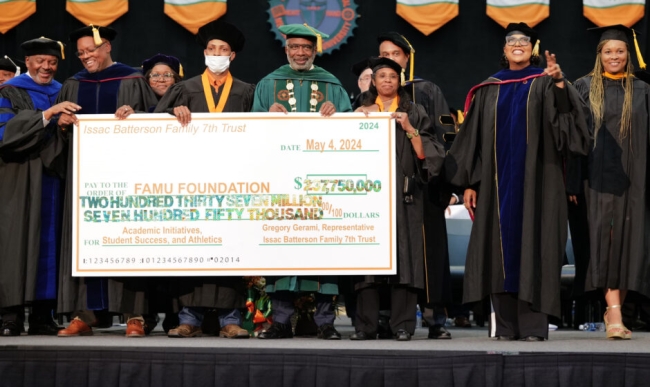You have /5 articles left.
Sign up for a free account or log in.

A little-known Texas-based hemp farmer donated $237 million to Florida A&M University on Saturday.
FAMU
Saturday was a day of celebration at Florida A&M University, as a young entrepreneur punctuated commencement at the historically black university by presenting a ceremonial check for $237.75 million to the institution’s president.
But the excitement has since been tinged by uncertainty and skepticism surrounding the donor and, by extension, the gift.
The donor, Gregory Gerami, is CEO of the Issac Batterson 7th Family Trust and founder of Batterson Farms Corp., a Texas-based hydroponic farming and hemp company.
Florida A&M officials welcomed the gift—worth nearly double the university’s current $121 million endowment—as “breathtaking in its generosity and its scope,” as President Larry Robinson said in a statement on Saturday. “It changes the narrative about what is possible for FAMU.”
But by the following day, skeptical observers began raising questions about Gerami, who last year backed out on his pledge to give Coastal Carolina University $95 million, citing disrespect and racism by the university. (This paragraph has been updated to clarify the reasons that Gerami withdrew his pledge.)
“As expected, some individuals in the public are and will continue researching Mr. Gerami,” said a statement FAMU released Sunday in response to questions about Gerami’s gift. “Please know that FAMU has done its due diligence when it comes to this matter.”
FAMU also made Gerami available for reporters’ questions at a hastily called virtual news conference Monday afternoon—though the answers left many things uncertain.
The Mysterious Donor
Born in 1993, Gerami spent the first two years of his life in the foster-care system before being adopted, and battled numerous health conditions including cerebral palsy, infant opioid addiction, and Fetal Alcohol Syndrome, according to a biography written by the Texas Hemp Reporter. While he did not attend FAMU—or any other college—Gerami was mentored by the former mayor of Arlington, Tex., and a local banker from Merrill Lynch.
“Capitalizing on these learnings, Gerami transformed his small-scale lawn care business into a successful property,” the Hemp Reporter article said. During the news conference hosted by Florida A&M on Monday, Gerami declined to state his total net worth or annual revenue, citing a nondisclosure agreement.
While Gerami didn’t have any previous ties to FAMU, he approached the university last fall about making a donation because “the university’s mission, direction and research capabilities in the area of hemp production strongly aligned with the work and goals of his farming company,” according to The Tallahassee Democrat.
“FAMU has become like a family to our trust, our company and to me,” Gerami said in a FAMU release announcing the donation. “Our morals and our mission are in line with FAMU and FAMU’s mission. It’s also about making sure that we set FAMU on the path to being the top HBCU in this country.”
Although Gerami said at the commencement ceremony that “the money is in the bank,” it’s not available as liquid cash quite yet.
Last month, Gerami said, he transferred the money in the form of stocks to FAMU (the $237.75 million represented the stock value at the time of transfer, he said). The university signed a nondisclosure agreement regarding the deal.
“It will be sold before the year is over,” Gerami said at Monday’s news conference, noting that he has invested in a variety of agricultural businesses, which he did not identify.
Gerami’s donation will support a broad range of academic, athletics and student success initiatives at FAMU, according to The Tallahassee Democrat.
Questions Arise
Doubts about Gerami began appearing online almost immediately after Saturday’s announcement.
“It is hard to avoid the feeling that this ‘donation'’will go down as one of the biggest scams in higher education history. If the money is indeed in the bank, I wonder if that will be shown to be false in a few days?,” Jerell Blakeley, a Howard University alumnus and lecturer at Rutgers University, wrote for the Substack page Education News Flash on Monday. He writes about HBCU issues.
“If the money is there without issue, then I’m wrong and the university has a foundation for great prosperity by way of an ultra rich, unknown business tycoon who seems to care little about how he or his business would benefit from such a bold philanthropic effort.”
Blakeley cited Gerami’s “strange” online presence as one driver of his skepticism about the donation, noting that there’s no mention of the Issac Batterson 7th Family Trust online beyond news coverage about the donation to Florida A&M.
Gerami, who said he intentionally keeps a low-profile online to protect his family, said at Monday's news conference that Blakeley’s information was “completely wrong,” but he did not elaborate on the details in the article that suggest Gerami may not have the kind of wealth he claims.
He told reporters that his company has about 7,000 employees and expects to grow to 10,000 by the end of the year. However, a search for the company on LinkedIn brings up “Gregory G.” as the only Batterson employee on the website.
“I have a lot of contractors,” he said in response to a reporter’s question about why none of his employees list the company on their LinkedIn pages. “We have a few full-time employees.”
When asked during Monday’s news conference for more details about who Issac Batterson is and how the trust operates, Gerami said doing so would breach his fiduciary responsibility to the trust.








